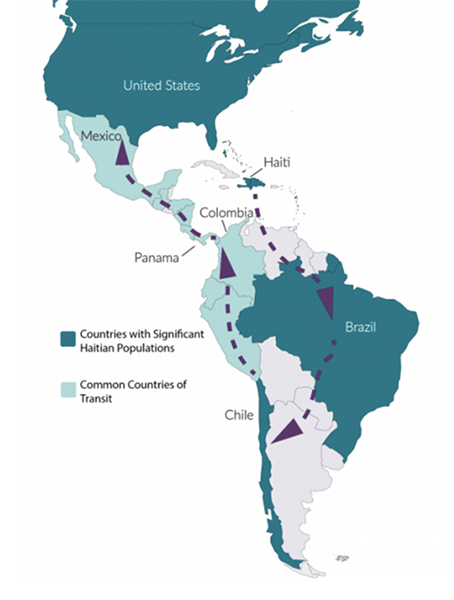Editor’s note: This article was originally published by our sister publication, the Tribuno del Puelo at www.tribunodelpueblo.org/
While we were all surprised by 15,000 Haitian immigrants arriving at Acuna, Mexico, just across from Del Rio, Texas, we should know that more are on the way.
This is not about Haitians coming to our southern border. But it is about our disturbing history of misguided foreign policies and practices that have left Haiti in a shambles.
No one wants to leave her or his country in search of survival in other countries. But as we know people will do whatever is necessary to survive.
It seems that Haitians for years had tried to go not only to the USA but also to other countries in Latin America. Haiti’s 2010 earthquake coincided with Brazil’s need for cheap labor for building installations for the Olympics. Thousands of desperate Haitians fled the ruined Haitian landscape finding work in Brazil, in Chile and in other countries which would exploit these hard-working immigrants.
When the pandemic hit, along with climate change and a major economic downturn, these multiple crises fed into growing racist attitudes which ultimately led to job loss and pressure to go in search of other opportunities. The most recent Haitian earthquake and the assassination of the Haitian president also led to Haitians escaping their country, often to Bolivia.
With a new administration in the White House, rumors of more humane immigration and asylum policies coupled with coyote/smugglers smelling the opportunity to exploit these over-embellished hopes and dreams, drove the Haitian migrant stream northward.
In my and my spouse’s work over the past three years in Tijuana, I discovered immigrants from many countries, including Haitians. When Haitians could not get asylum and were returned to Tijuana, they decided to settle, set up businesses and put their kids in school. In interviews, my spouse did with employers and managers of shelters, Haitians were singled out as the good example of an immigrant populations. We often heard of the good experience people had with Haitian immigrants.
When I first heard of the Haitians settling in Tijuana, there was a story of Mexican woman who had a small restaurant. Noticing the many hungry Haitian workers, she learned to cook common Haitian dishes. When the workers had little or no money, she fed them for free. She has continued to cater to her Haitian customers, who, in turn, are now regulars at her restaurant.
Beginning in September 2021, dozens of buses began arriving in Acuna each day filled with Haitians. Acuna, this small Mexican town, was being overwhelmed by these many buses that were arriving and dumping these people on the streets. Soon a makeshift refugee shelter began to take shape under the bridge.
The response by both border governments was less than adequate. Among the adults were children who had been born in other Latin American countries along the multi-year migration route and, as a result, they were not even citizens of Haiti.
The manner in which they arrived in Acuna opened the dark door to bribery and extortion. But is this surprising? We see how easy it is for drug cartels to transport drugs to the USA with some high-dollar bribes along the way.
At the time of this writing, it is being reported that thousands of more Haitians are on their way north, congregating in Colombia, making their trek through and around the Darien Gap, which is a 100-mile section of impassible jungle between Central and South America. There are no roads through the jungle, only footpaths and small ferries and boats.
We are told that a ferry system is taking these immigrants part of the way and they are then transferred into smaller boats operated by smugglers who sells these migrating souls’ water-proof plastic pouches to protect their phones and other documents. They also offer Internet access for $50 an hour.
The Internet is how these immigrants communicate with smugglers and their families who can send them funds and track their travel.
It is a costly situation where immigrants sell everything they have, often becoming indebted to smugglers who can be ruthless at getting paid.
It is clear that we need to develop a multilateral strategy for addressing immigration in the Americas which could also meet the demand for labor here and around the region. It is wrong-headed to think that deportation is the solution.
We must first be humane and smart in responding to this new multilateral migration reality.

